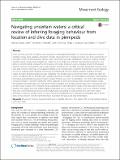Navigating uncertain waters: a critical review of inferring foraging behaviour from location and dive data in pinnipeds
Abstract
In the last thirty years, the emergence and progression of biologging technology has led to great advances in marine predator ecology. Large databases of location and dive observations from biologging devices have been compiled for an increasing number of diving predator species (such as pinnipeds, sea turtles, seabirds and cetaceans), enabling complex questions about animal activity budgets and habitat use to be addressed. Central to answering these questions is our ability to correctly identify and quantify the frequency of essential behaviours, such as foraging. Despite technological advances that have increased the quality and resolution of location and dive data, accurately interpreting behaviour from such data remains a challenge, and analytical methods are only beginning to unlock the full potential of existing datasets. This review evaluates both traditional and emerging methods and presents a starting platform of options for future studies of marine predator foraging ecology, particularly from location and two-dimensional (time-depth) dive data. We outline the different devices and data types available, discuss the limitations and advantages of commonly-used analytical techniques, and highlight key areas for future research. We focus our review on pinnipeds - one of the most studied taxa of marine predators - but offer insights that will be applicable to other air-breathing marine predator tracking studies. We highlight that traditionally-used methods for inferring foraging from location and dive data, such as first-passage time and dive shape analysis, have important caveats and limitations depending on the nature of the data and the research question. We suggest that more holistic statistical techniques, such as state-space models, which can synthesise multiple track, dive and environmental metrics whilst simultaneously accounting for measurement error, offer more robust alternatives. Finally, we identify a need for more research to elucidate the role of physical oceanography, device effects, study animal selection, and developmental stages in predator behaviour and data interpretation.
Citation
Carter , M I D , Bennett , K A , Embling , C B , Hosegood , P J & Russell , D J F 2016 , ' Navigating uncertain waters: a critical review of inferring foraging behaviour from location and dive data in pinnipeds ' , Movement Ecology , vol. 4 , 25 . https://doi.org/10.1186/s40462-016-0090-9
Publication
Movement Ecology
Status
Peer reviewed
ISSN
2051-3933Type
Journal item
Description
MIDC PhD studentship co-funded by Natural Environmental Research Council (NERC) and School of Marine Science and Engineering, Plymouth University. DJFR is supported by National Capability funding from NERC to the Sea Mammal Research Unit (grant no. SMRU1001).Collections
Items in the St Andrews Research Repository are protected by copyright, with all rights reserved, unless otherwise indicated.

